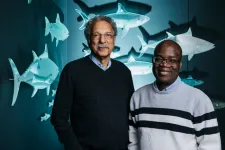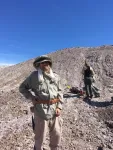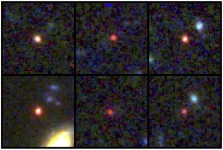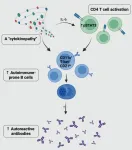(Press-News.org) Two courageous UBC ocean fisheries experts - marine biologist Dr. Daniel Pauly and fisheries economist Dr. Rashid Sumaila — have been awarded the 2023 Tyler Prize for Environmental Achievement.
The award, administered by the University of Southern California, has often been described as the ‘Nobel Prize for the Environment.’
Both are University Killam Professors at the University of British Columbia, and long-time colleagues at its Institute for the Oceans and Fisheries. They said that winning this prize gives them an opportunity to spread an urgent and evidence-based message: all fishing on the high seas should be banned.
“If we don’t stop overfishing, we will lose marine stocks essential for food security and biodiversity, and the ocean’s ability to effectively regulate global temperatures,” added Pauly, who is the Founder and Principal Investigator of the UBC research initiative Sea Around Us.
Dr. Pauly has spent much of his four decades of research documenting the rapid decline of marine and fresh-water fish. He gained worldwide recognition for popularizing the term ‘Shifting Baselines’ – which explains how knowledge of environmental declines fades over time, leading to a misguided understanding of change on our planet. He has been the world’s most-cited fisheries scientist since 2010.
Dr. Sumaila’s research focuses on bioeconomics, marine ecosystem valuation and the analysis of global issues such as fisheries subsidies, marine protected areas, illegal fishing, climate change, marine plastic pollution, and oil spills. The question of how to “bequeath a healthy ocean to our children and grandchildren, so they too can have the option to do the same” – is what drives his life’s work. Sumaila has experience working in fisheries and natural resource projects in around the world, which has made him the world’s most cited fisheries economist, natural resource economist, and ocean policy expert.
“Creating no-take marine reserves is something we must do. Banning fishing in the high seas, which is the area outside the 200-nautical-mile zones of maritime countries, will create a critically-needed ‘fish bank’ for the world,” said Sumaila, who is the Canada Research Chair in Interdisciplinary Ocean and Fisheries Economics, and is jointly appointed at UBC’s School of Public Policy and Global Affairs.
Both have published extensively on the ecological and economic effects of the overfishing on the high seas. “A high seas fishing ban is one of the most effective ways to reverse the damage inflicted on the ocean through decades of unsustainable overfishing, mostly at the hands of wealthy Western countries,” Pauly said. “Our modeling shows that closing the high seas would result in no loss in total global catch – just a more equitable distribution. Most commercially fished species move back and forth between the high seas and coastal areas, where they can be caught in a country’s exclusive economic zone (EEZ).”
Sumaila added that support for a high seas fishing ban continues to grow – and that the closing of Antarctica’s Ross Sea in 2016, which created the world’s largest marine protected area – served as a valuable model. “More than 190 countries committed to the 30x30 agreement at the Convention of Biodiversity Conference of the Parties (COP15) in December – to protect 30 percent of their land and waters by 2030… so there are good signs of progress,” Sumaila said. “But we must move faster. Overfishing increases global emergencies such as climate change, biodiversity loss and food insecurity – particularly for already vulnerable communities, such as Indigenous Peoples and populations in the Global South.”
“Rashid and Daniel are an incredible duo — their work has had an immense impact on our understanding of ocean fisheries and marine sustainability, and generated a wealth of policy outcomes around the globe,” said Professor Meigan Aronson, Dean, UBC Science. "We couldn’t be prouder of this recognition from the Tyler Prize Executive Committee.
Chair of the Tyler Prize for Environmental Achievement, Julia Marton-Lefèvre said that she is honored to bestow this historic recognition upon scientists dedicated to protecting natural resources for future generations. “Our lives and livelihoods depend on the ocean, which covers more than 70 per cent of Earth. The Tyler Prize Executive Committee recognizes Professors Pauly’s and Sumaila’s outstanding individual and complementary achievements towards the conservation of this global life-source. By pioneering analytical approaches and knowledge platforms to assess the global state of world fisheries, they have discovered viable solutions, offering policymakers a realistic pathway towards the sustainable management of ocean fisheries,” Marton-Lefèvre said.
On April 27, 2023, the Laureates will deliver a public presentation on their work at the University of Southern California.
END
UBC's Daniel Pauly and Rashid Sumaila win Tyler Prize for Environmental Achievement
The award, administered by the University of Southern California, has often been described as the ‘Nobel Prize for the Environment.’
2023-02-22
ELSE PRESS RELEASES FROM THIS DATE:
MD Anderson Research Highlights for February 22, 2023
2023-02-22
HOUSTON ― The University of Texas MD Anderson Cancer Center’s Research Highlights showcases the latest breakthroughs in cancer care, research and prevention. These advances are made possible through seamless collaboration between MD Anderson’s world-leading clinicians and scientists, bringing discoveries from the lab to the clinic and back.
Recent developments include a new understanding of how HPV drives cancer development, a combination therapy to overcome treatment resistance in mantle cell lymphoma, novel ...
Early Cretaceous shift in the global carbon cycle affected both land and sea
2023-02-22
Scientists continue to refine techniques for understanding present-day changes in Earth’s environmental systems, but the planet’s distant past also offers crucial information to deepen that understanding. A geological study by University of Nebraska–Lincoln scientist Matt Joeckel and colleagues provides such information.
Scientific research in recent decades has confirmed that major changes in the global carbon cycle caused significant changes in the Earth’s atmosphere and oceans 135 million years ago, during the early Cretaceous Period. A range of questions remain about the ...
Discovery of massive early galaxies defies prior understanding of the universe
2023-02-22
UNIVERSITY PARK, Pa. — Six massive galaxies discovered in the early universe are upending what scientists previously understood about the origins of galaxies in the universe.
“These objects are way more massive than anyone expected,” said Joel Leja, assistant professor of astronomy and astrophysics at Penn State, who modeled light from these galaxies. “We expected only to find tiny, young, baby galaxies at this point in time, but we’ve discovered galaxies as mature as our own in what was previously understood to be the dawn of the universe.”
Using the first dataset released from NASA's James Webb Space Telescope, ...
Mechanisms underlying autoimmunity in Down syndrome revealed
2023-02-22
New York, NY (February 22, 2023) – Scientists at the Icahn School of Medicine at Mount Sinai in New York have identified which parts of the immune system go awry and contribute to autoimmune diseases in individuals with Down syndrome. The findings published in the February 22 online issue of Nature [DOI: https://doi.org/10.1038/s41586-023-05736-y].
The work adds to the research team’s findings published in the journal Immunity in October 2022, showing that people with Down syndrome have less frequent but more severe viral infections.
Studying lab specimens from volunteers with Down syndrome, the investigators identified cytokines and a B cell subtype—key ...
Patients identified as frail before surgery less likely to die one year after
2023-02-22
PITTSBURGH, Feb. 22, 2023 – New research published today in JAMA Surgery shows that when frail patients are connected to resources, including conversations with a physician about possible outcomes and help preparing their body for surgery, they are less likely to die one year after surgery.
While age can be an important indicator of a patient’s likelihood of encountering adverse outcomes or complications of surgery, it does not provide a full picture of their health. Frailty considers the patient’s overall well-being, including their physical and cognitive abilities, as well as their body’s ability to recover from surgery.
“Frailty ...
Association of pandemic with unsafe living situations, intimate partner violence among pregnant individuals
2023-02-22
About The Study: This study found an overall increase in unstable and/or unsafe living situations and intimate partner violence (IPV) between January 2019 and December 2020, with a temporary increase associated with the COVID-19 pandemic. It may be useful for emergency response plans to include IPV safeguards for future pandemics. These findings suggest the need for prenatal screening for unsafe and/or unstable living situations and IPV coupled with referral to appropriate support services and preventive ...
Incidence of aggressive end-of-life care among older adults with metastatic cancer in nursing homes and community settings
2023-02-22
About The Study: The results of this study suggest that despite increased emphasis to reduce aggressive end-of-life care in the past several decades, such care remains common among older persons with metastatic cancer and is slightly more prevalent among nursing home residents than their community-dwelling counterparts. Multilevel interventions to decrease aggressive end-of-life care should target the main factors associated with its prevalence, including hospital admissions in the last 30 days of life and in-hospital death.
Authors: Siran M. Koroukian, Ph.D., of the Case Western Reserve University School of Medicine in Cleveland, is the corresponding ...
Rising river temperatures hold important clues about climate and other human impacts
2023-02-22
An improved global understanding of river temperature could provide an important barometer for climate change and other human activities.
River temperature is the fundamental water quality measure that regulates physical, chemical and biological processes in flowing waters and, in turn, impacts ecosystems, human health, and industrial, domestic and recreational uses by people.
In a comment piece in the new journal, Nature Water, researchers led by the University of Birmingham, UK, and Indiana University, USA, have called for an increased ...
Human body proven to predict mealtimes
2023-02-22
The human body can predict the timing of regular meals, according to a new study from the University of Surrey. The research team also found that daily blood glucose rhythms may be driven not only by meal timing but by meal size.
In the first study of its kind, researchers from Surrey, led by Professor Jonathan Johnston, investigated if the human circadian system anticipates large meals. Circadian rhythms/systems are physiological changes, including metabolic, that follow a 24-hour cycle and are usually synchronised to environmental signals, such as light and dark cycles.
Previous ...
James Webb spots super old, massive galaxies that shouldn’t exist
2023-02-22
In a new study, an international team of astrophysicists has discovered several mysterious objects hiding in images from the James Webb Space Telescope: six potential galaxies that emerged so early in the universe’s history and are so massive they should not be possible under current cosmological theory.
Each of the candidate galaxies may have existed at the dawn of the universe roughly 500 to 700 million years after the Big Bang, or more than 13 billion years ago. They’re also gigantic, containing almost as many stars as the modern-day Milky Way Galaxy.
“It’s ...
LAST 30 PRESS RELEASES:
Cost of copper must rise double to meet basic copper needs
A gel for wounds that won’t heal
Iron, carbon, and the art of toxic cleanup
Organic soil amendments work together to help sandy soils hold water longer, study finds
Hidden carbon in mangrove soils may play a larger role in climate regulation than previously thought
Weight-loss wonder pills prompt scrutiny of key ingredient
Nonprofit leader Diane Dodge to receive 2026 Penn Nursing Renfield Foundation Award for Global Women’s Health
Maternal smoking during pregnancy may be linked to higher blood pressure in children, NIH study finds
New Lund model aims to shorten the path to life-saving cell and gene therapies
Researchers create ultra-stretchable, liquid-repellent materials via laser ablation
Combining AI with OCT shows potential for detecting lipid-rich plaques in coronary arteries
SeaCast revolutionizes Mediterranean Sea forecasting with AI-powered speed and accuracy
JMIR Publications’ JMIR Bioinformatics and Biotechnology invites submissions on Bridging Data, AI, and Innovation to Transform Health
Honey bees navigate more precisely than previously thought
Air pollution may directly contribute to Alzheimer’s disease
Study finds early imaging after pediatric UTIs may do more harm than good
UC San Diego Health joins national research for maternal-fetal care
New biomarker predicts chemotherapy response in triple-negative breast cancer
Treatment algorithms featured in Brain Trauma Foundation’s update of guidelines for care of patients with penetrating traumatic brain injury
Over 40% of musicians experience tinnitus; hearing loss and hyperacusis also significantly elevated
Artificial intelligence predicts colorectal cancer risk in ulcerative colitis patients
Mayo Clinic installs first magnetic nanoparticle hyperthermia system for cancer research in the US
Calibr-Skaggs and Kainomyx launch collaboration to pioneer novel malaria treatments
JAX-NYSCF Collaborative and GSK announce collaboration to advance translational models for neurodegenerative disease research
Classifying pediatric brain tumors by liquid biopsy using artificial intelligence
Insilico Medicine initiates AI driven collaboration with leading global cancer center to identify novel targets for gastroesophageal cancers
Immunotherapy plus chemotherapy before surgery shows promise for pancreatic cancer
A “smart fluid” you can reconfigure with temperature
New research suggests myopia is driven by how we use our eyes indoors
Scientists develop first-of-its-kind antibody to block Epstein Barr virus
[Press-News.org] UBC's Daniel Pauly and Rashid Sumaila win Tyler Prize for Environmental AchievementThe award, administered by the University of Southern California, has often been described as the ‘Nobel Prize for the Environment.’





